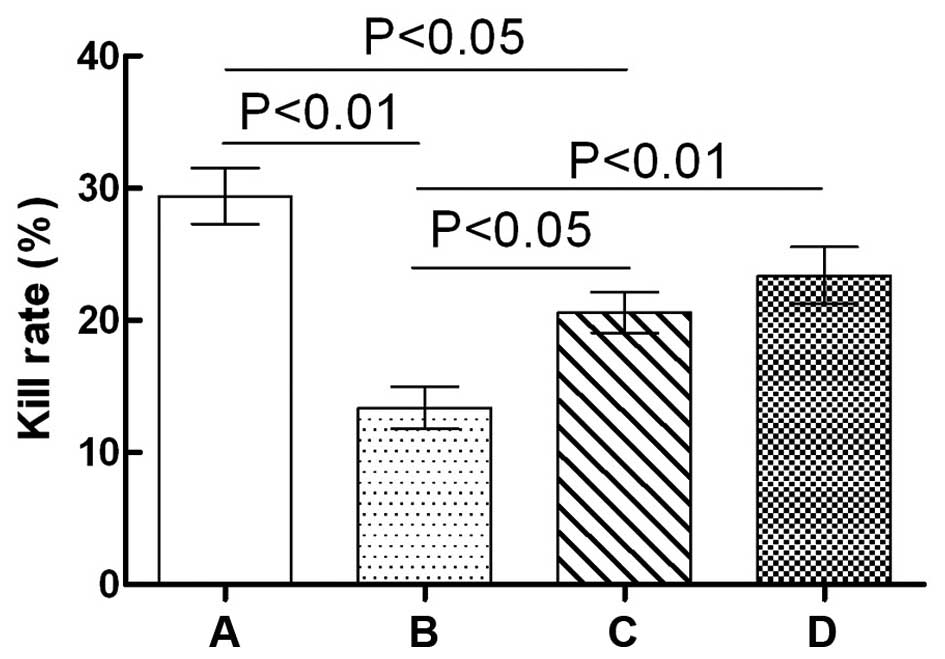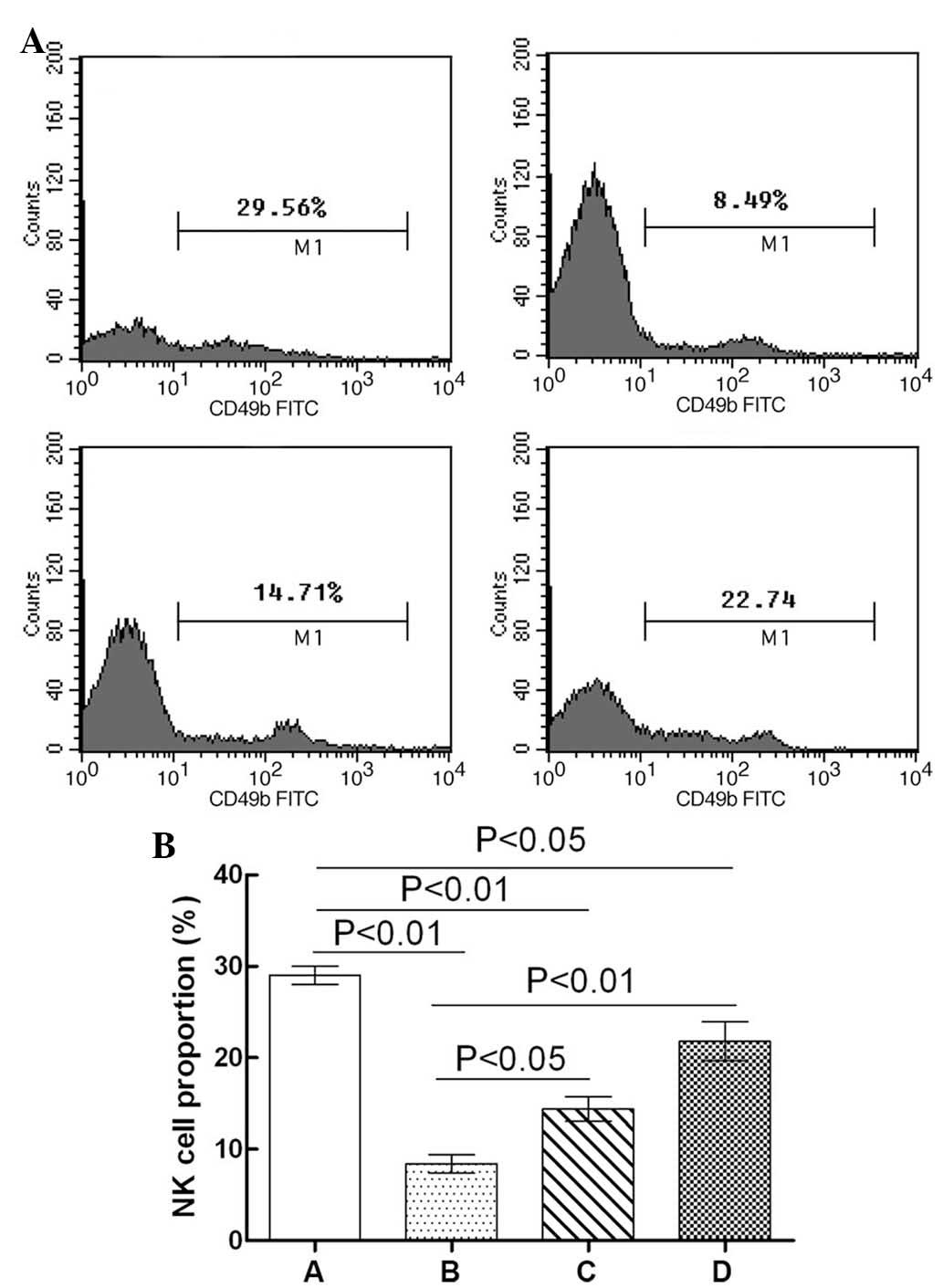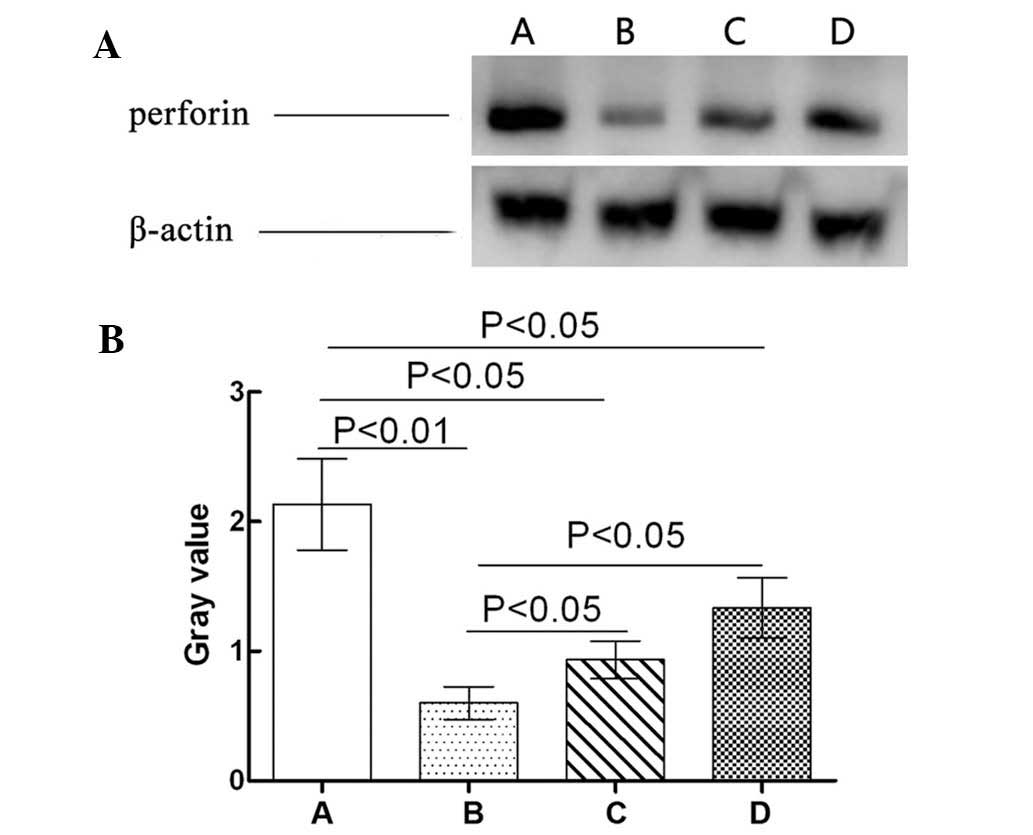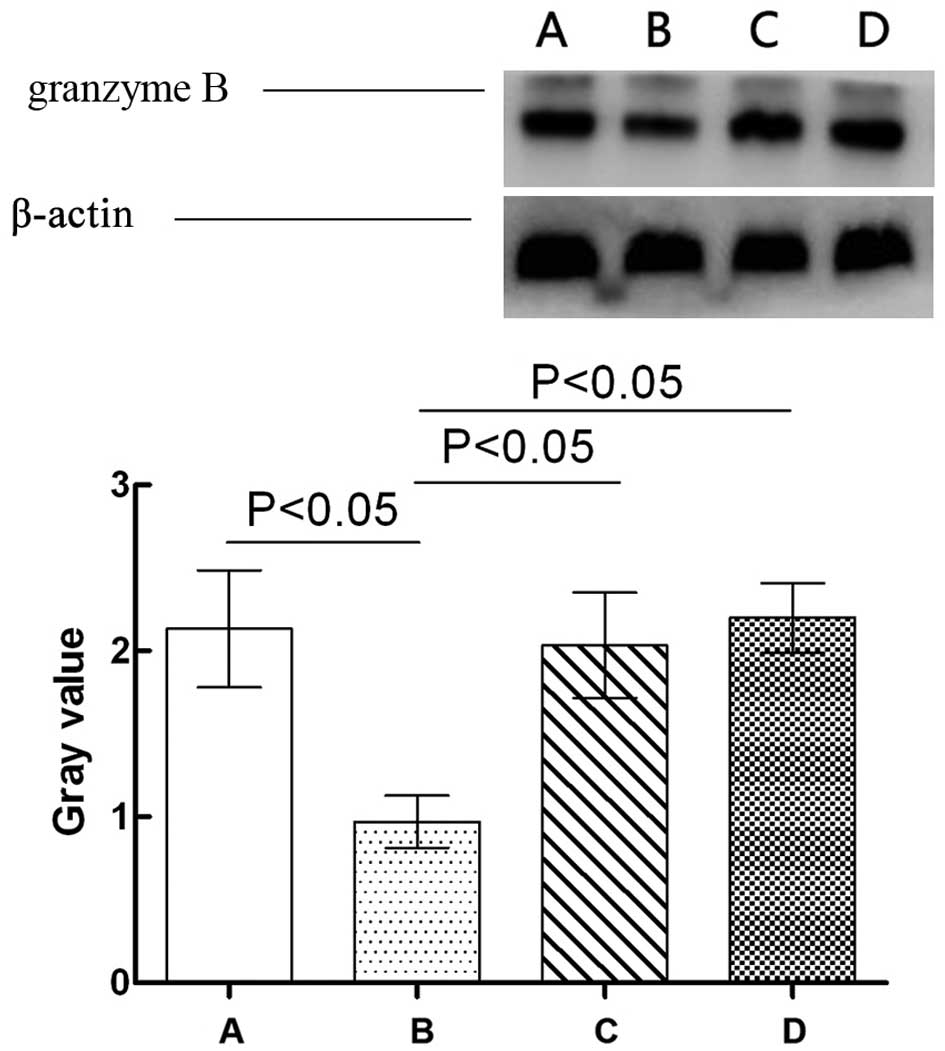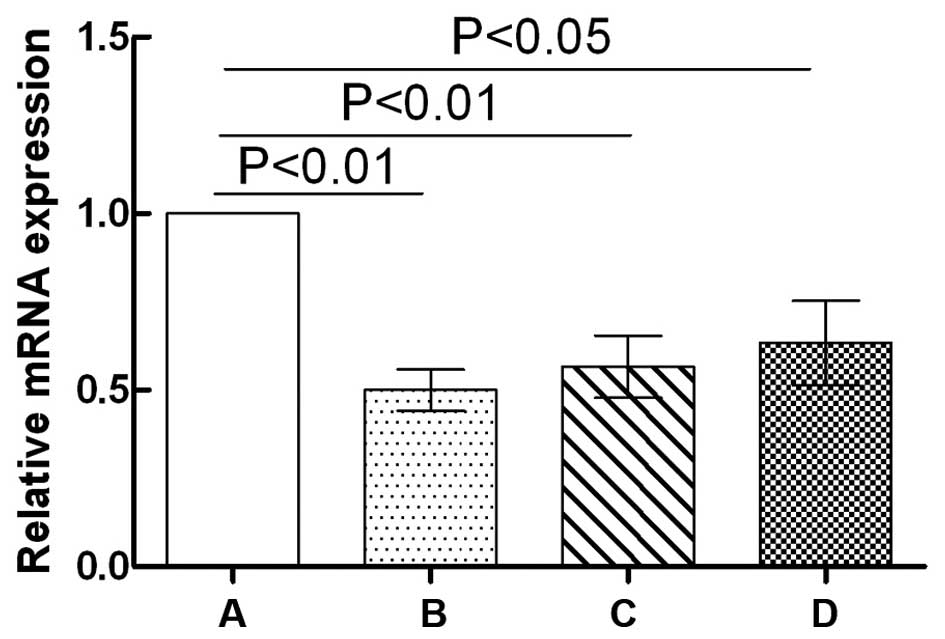|
1
|
Kwak JH, Park JY, Lee D, Kwak JY, Park EH,
Kim KH, Park HJ, Kim HY, Jang HJ, Ham J, et al: Inhibitory effects
of ginseng sapogenins on the proliferation of triple negative
breast cancer MDA-MB-231 cells. Bioorg Med Chem Lett. 24:5409–5412.
2014. View Article : Google Scholar : PubMed/NCBI
|
|
2
|
Lee MH, Lee BH, Lee S and Choi C:
Reduction of hepatitis A virus on FRhK-4 cells treated with Korean
red ginseng extract and ginsenosides. J Food Sci. 78:M1412–M1415.
2013. View Article : Google Scholar : PubMed/NCBI
|
|
3
|
Jiao L, Zhang X, Li B, Liu Z, Wang M and
Liu S: Anti-tumour and immunomodulatory activities of
oligosaccharides isolated from Panax ginseng C.A. Meyer. Int J Biol
Macromol. 65:229–233. 2014. View Article : Google Scholar : PubMed/NCBI
|
|
4
|
Li C, Cai J, Geng J, Li Y, Wang Z and Li
R: Purification, characterization and anticancer activity of a
polysaccharide from Panax ginseng. Int J Biol Macromol. 51:968–973.
2012. View Article : Google Scholar : PubMed/NCBI
|
|
5
|
Ban JY, Kang SW, Lee JS, Chung JH, Ko YG
and Choi HS: Korean red ginseng protects against neuronal damage
induced by transient focal ischemia in rats. Exp Ther Med.
3:693–698. 2012.PubMed/NCBI
|
|
6
|
Yang JW and Kim SS: Ginsenoside Rc
promotes anti-adipogenic activity on 3T3-L1 adipocytes by
down-regulating C/EBPα and PPARγ. Molecules. 20:1293–1303. 2015.
View Article : Google Scholar : PubMed/NCBI
|
|
7
|
Ni W, Zhang X, Wang B, Chen Y, Han H, Fan
Y, Zhou Y and Tai G: Antitumor activities and immunomodulatory
effects of ginseng neutral polysaccharides in combination with
5-fluorouracil. J Med Food. 13:270–277. 2010. View Article : Google Scholar : PubMed/NCBI
|
|
8
|
Wang J, Zuo G, Li J, Guan T, Li C, Jiang
R, Xie B, Lin X, Li F, Wang Y and Chen D: Induction of tumoricidal
activity in mouse peritoneal macrophages by ginseng polysaccharide.
Int J Biol Macromol. 46:389–395. 2010. View Article : Google Scholar : PubMed/NCBI
|
|
9
|
Cai JP, Wu YJ, Li C, Feng MY, Shi QT, Li
R, Wang ZY and Geng JS: Panax ginseng polysaccharide suppresses
metastasis via modulating Twist expression in gastriccancer. Int J
Biol Macromol. 57:22–25. 2013. View Article : Google Scholar : PubMed/NCBI
|
|
10
|
Cheng H, Li S, Fan Y, Gao X, Hao M, Wang
J, Zhang X, Tai G and Zhou Y: Comparative studies of the
antiproliferative effects of ginseng polysaccharides on HT-29 human
colon cancer cells. Med Oncol. 28:175–181. 2011. View Article : Google Scholar : PubMed/NCBI
|
|
11
|
Yamaoka Y, Kawakita T, Kaneko M and Nomoto
K: A polysaccharide fraction of Zizyphi fructus in augmenting
natural killer activity by oral administration. Biol Pharm Bull.
19:936–939. 1996. View Article : Google Scholar : PubMed/NCBI
|
|
12
|
Xie FY, Zeng ZF and Huang HY: Clinical
observation on nasopharyngeal carcinoma treated with combined
therapy of radiotherapy and ginseng polysaccharide injection.
Zhongguo Zhong Xi Yi Jie He Za Zhi. 21:332–334. 2001.(In Chinese).
PubMed/NCBI
|
|
13
|
Cho YJ, Son HJ and Kim KS: A 14-week
randomized, placebo-controlled, double-blind clinical trial to
evaluate the efficacy and safety of ginseng polysaccharide (Y-75).
J Transl Med. 12:2832014. View Article : Google Scholar : PubMed/NCBI
|
|
14
|
Livak KJ and Schmittgen TD: Analysis of
relative gene expression data using real-time quantitative PCR and
the 2-ΔΔCt method. Methods. 25:402–408. 2001. View Article : Google Scholar : PubMed/NCBI
|
|
15
|
Watzl C: How to trigger a killer:
Modulation of natural killer cell reactivity on many levels. Adv
Immunol. 124:137–170. 2014. View Article : Google Scholar : PubMed/NCBI
|
|
16
|
Eddy JL, Krukowski K, Janusek L and
Mathews HL: Glucocorticoids regulate natural killer cell function
epigenetically. Cell Immunol. 290:120–130. 2014. View Article : Google Scholar : PubMed/NCBI
|
|
17
|
Cox JH: Evaluation of natural killer cell
activity. Methods Mol Med. 17:383–389. 1999.PubMed/NCBI
|
|
18
|
Jiang W, Zhang C, Tian Z and Zhang J:
hIFN-α gene modification augments human natural killer cell line
anti-human hepatocellular carcinoma function. Gene Ther.
20:1062–1069. 2013. View Article : Google Scholar : PubMed/NCBI
|
|
19
|
Li Q, Kobayashi M, Wakayama Y, Inagaki H,
Katsumata M, Hirata Y, Hirata K, Shimizu T, Kawada T, Park BJ, et
al: Effect of phytoncide from trees on human natural killer cell
function. Int J Immunopathol Pharmacol. 22:951–959. 2009.PubMed/NCBI
|
|
20
|
Ahlenstiel G: The natural killer cell
response to HCV infection. Immune Netw. 13:168–176. 2013.
View Article : Google Scholar : PubMed/NCBI
|
|
21
|
Campbell KS and Hasegawa J: Natural killer
cell biology: An update and future directions. J Allergy Clin
Immunol. 132:536–544. 2013. View Article : Google Scholar : PubMed/NCBI
|
|
22
|
Lin SJ, Yan DC, Lee WI, Kuo ML, Hsiao HS
and Lee PY: Effect of azithromycin on natural killer cell function.
Int Immunopharmacol. 13:8–14. 2012. View Article : Google Scholar : PubMed/NCBI
|
|
23
|
Zhou X, Shi H, Jiang G, Zhou Y and Xu J:
Antitumor activities of ginseng polysaccharide in C57BL/6 mice with
Lewis lung carcinoma. Tumour Biol. 35:12561–12566. 2014. View Article : Google Scholar : PubMed/NCBI
|
|
24
|
Jiao L, Zhang X, Li B, Liu Z, Wang M and
Liu S: Anti-tumour and immunomodulatory activities of
oligosaccharides isolated from Panax ginseng C.A. Meyer. Int J Biol
Macromol. 65:229–233. 2014. View Article : Google Scholar : PubMed/NCBI
|















